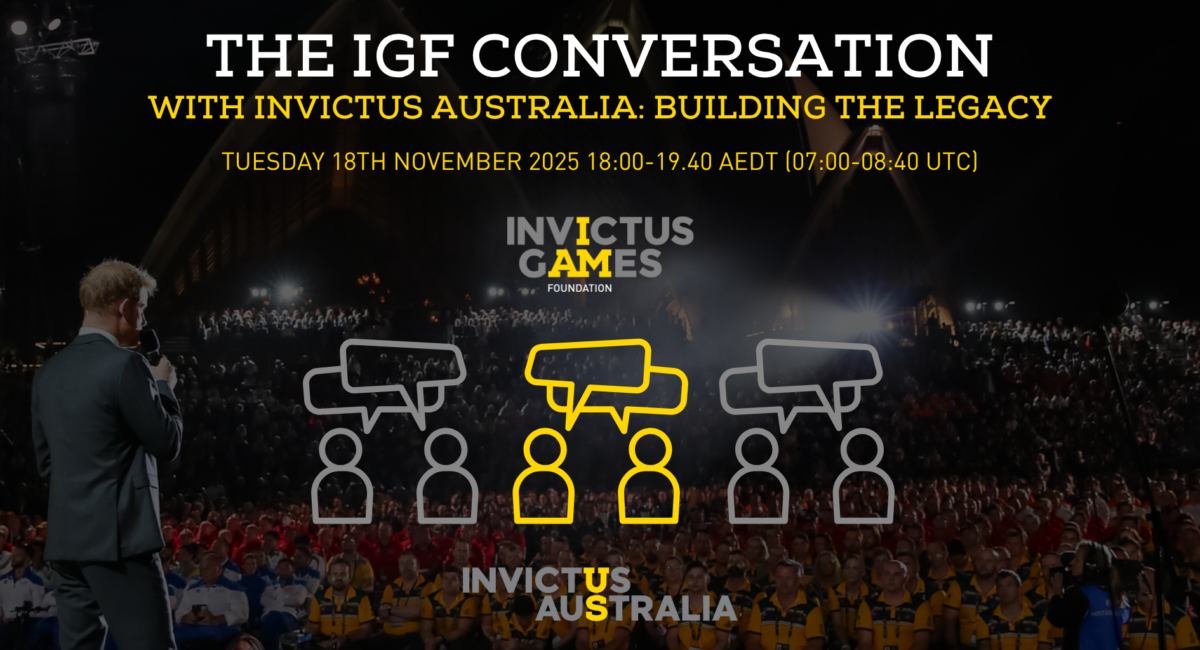The Invictus Games Foundation (IGF) is delighted to announce the next instalment of its IGF Conversations series: “The IGF Conversation with Invictus Australia: Building the Legacy.” The event will take place virtually on Tuesday, 18 November at 18:00 AEDT / 07:00 GMT / 08:00 CET.
This special edition will be hosted live from the Sydney headquarters of our partners at Invictus Australia (IA), marking the first time an IGF Conversation has been delivered from across the globe.
Strengthening the Legacy of the Games
Invictus Australia was the first legacy organisation formed after hosting the Invictus Games in Sydney in 2018. Since then, IA has continued to deliver year-round adaptive sport and rehabilitation programmes for veterans and their families across the country.
This upcoming IGF Conversation will explore how Invictus Australia’s model exemplifies the long-term legacy the Games can leave behind, where sustainable and community-based recovery opportunities are created to support the local wounded, injured or sick service personnel and veteran after the Games are finished.
The discussion aligns with the Invictus Games Foundation’s newly released strategy to build a truly global Movement and that we can ensure recovery through sport continues beyond the Games.
The event will open with a discussion titled Invictus Programmes Beyond the Games: What Happens When the Lights Go Off. This panel brings together leaders from across the Invictus Community of Nations to explore how host nations continue the work long after the Games conclude. Speakers include Michael Hartung OAM, CEO of Invictus Australia; Martin Ammermann, Co-Project Lead of Invictus Games Düsseldorf 2023 and Executive Director of D-Live in Germany; and Nick Booth MVO, CEO of True Patriot Love Foundation in Canada. Each will share their nation’s journey, from Invictus Australia’s seven-year evolution since hosting the Games in 2018, to Germany’s growing sports legacy after Düsseldorf 2023, and Canada’s early steps in shaping a sustainable post-Games future. The panel will highlight how there is no single model for success, with each country adapting the vision of recovery to its own culture, systems, and communities.
The second panel, The Value of Partnerships in the Community, will explore how collaboration drives long-term impact for veterans and their families. Representatives from Boeing and Invictus Australia will share how partnerships can extend far beyond Games-time sponsorships to deliver tangible community outcomes. Amy List, Managing Director of Boeing Defence Australia, Simon ‘OB’ O’Brien, Senior Manager at Boeing UK, Vanessa Bernardo, Director of Strategic Partnerships and Brand at Invictus Australia, and Adam Jackson, Invictus Games alumni, will speak to Boeing’s ongoing commitment to the Invictus Community. One in five Boeing Australia employees are veterans, and through this partnership, Boeing and Invictus Australia have delivered life-changing sport and wellbeing programmes across the country. The discussion will reinforce how global partners can empower local initiatives, create inclusive opportunities, and sustain the legacy of the Games through meaningful engagement.
The third and final panel, Impact: Talking to the Evidence Base that Supports the Impact of Sport for Veterans and Their Families, will turn the attention towards the growing body of research that underpins the Movement. Experts from Australia, Canada, and the United States will share new insights into the measurable benefits of sport on wellbeing, recovery, and community connection. The panel will feature Dr Celina Shirazipour, IGF Research Consultant and Assistant Professor at Cedars-Sinai Medical Center; Dr Jon Lane, Chief Psychiatrist at Australia’s Department of Veterans’ Affairs and former Invictus Team Australia coach; Neil Burgin, Director of Strategy and Research at Invictus Australia; and Dr Nicholas Held, Interim Scientific Director at the Canadian Institute for Military and Veteran Health Research. Together, they will present findings from Invictus Australia’s foundational studies into the social and economic impact of sport, the IGF’s Beyond the Finish Line longitudinal study, and CIMVHR’s ongoing research into the recent Invictus Games of Vancouver Whistler 2025. The discussion will emphasise that evidence-based insights are critical to shaping future programs, influencing policy, and strengthening the global Invictus Community.
You can explore the event programme, speaker lineup, and register for a free ticket via the link here.
